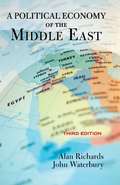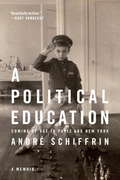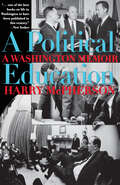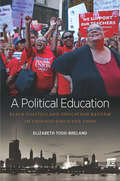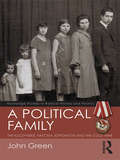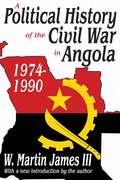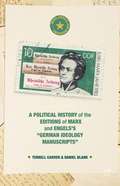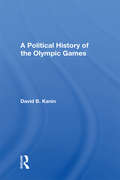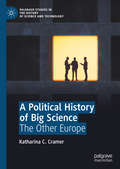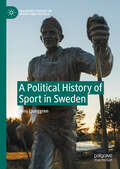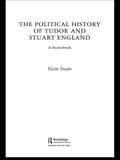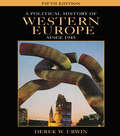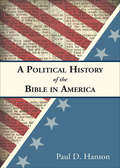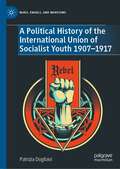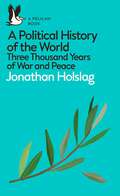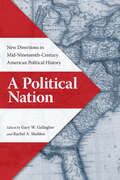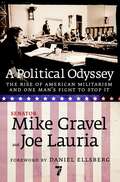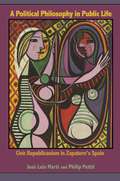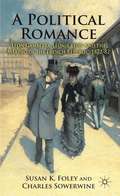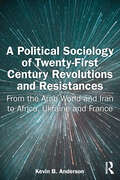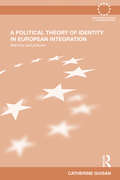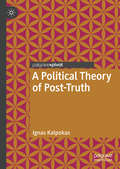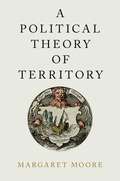- Table View
- List View
A Political Economy of the Middle East
by John Waterbury Alan RichardsThis integrated, analytic text presents a comprehensive analysis of the transformation of the political economy of development in the contemporary Middle East over the past several decades. Extensively rewritten and revised, the third edition of A Political Economy of the Middle East retains a focus on the interaction of economic development processes, state systems, and social actors even as it also: Documents the many changes in demography, education, labor markets, urbanization, water and agriculture, and international labor migration in the Middle East in recent years; Considers the effect of rising oil prices on reinforcement of authoritarian governance in the region; Refines its assessment of "the Washington Consensus" to provide a more nuanced approach to the issue of the shifting balance of state and market in economic growth and reform (in an entirely rewritten Chapter 9); Presents Islamism as a vital force in the region that is nonetheless a vast, diverse social movement with many conflicting participants (in a wholly revised Chapter 14).
A Political Education
by Andre Schiffrin"Schiffrin evokes the bittersweet tang of émigré life in New York." --The New York Times Book Review André Schiffrin was born the son of one of France's most esteemed publishers, in a world peopled by some of the day's leading writers and intellectuals, such as André Gide, Jean-Paul Sartre, and Antoine de Saint-Exupéry. But this world was torn apart when the Nazis marched into Paris on young André's fifth birthday. Beginning with the family's dramatic escape to Casablanca--thanks to the help of the legendary Varian Fry--and eventually New York, A Political Education recounts the surprising twists and turns of a life that saw Schiffrin become, himself, one of the world's most respected publishers. Emerging from the émigré community of wartime New York (a community that included his father's friends Hannah Arendt and Helen and Kurt Wolff), he would go on to develop an insatiable appetite for literature and politics: heading a national student group he renamed the Students for a Democratic Society--the SDS . . . leading student groups at European conferences, once, as an unwitting front man for the CIA . . . and eventually being appointed by Random House chief Bennett Cerf to head the very imprint cofounded by his father--Pantheon. There, he would discover and publish some of the world's leading writers, including Noam Chomsky, Michel Foucault, Art Spiegelman, Studs Terkel, and Marguerite Duras. But in a move that would make headlines, Schiffrin would ultimately rebel at corporate ownership and form his own publishing house--The New Press--where he would go on to set a new standard for independent publishing. A Political Education is a fascinating intellectual memoir that tells not only the story of a unique and important figure, but of the tumultuous political times that shaped him.From the Hardcover edition.
A Political Education: A Washington Memoir
by Harry McPhersonThis classic political memoir offers an insider’s view of Washington in the ‘50s and ‘60s—with a preface by the author reflecting on the Clinton era.A Texas native, Harry McPherson went to Washington in 1956 as an assistant to Senate Majority Leader Lyndon Johnson. He served in key posts under Presidents Kennedy and Johnson, including as Johnson’s special counsel and speechwriter.In Political Education, McPherson offers a vividly evocative portrait of Johnson’s tumultuous presidency and of the conflicts and factions of the president's staff. Long regarded as a political classic, it is essential reading for anyone seeking to understand national politics of the period.In 1995, McPherson added a preface discussing how Washington had changed since the Johnson era. In it he suggests what lessons Bill Clinton could have learn from Johnson’s time in the Oval Office.
A Political Education: A Washington Memoir
by Harry McPhersonThis classic political memoir offers an insider’s view of Washington in the ‘50s and ‘60s—with a preface by the author reflecting on the Clinton era.A Texas native, Harry McPherson went to Washington in 1956 as an assistant to Senate Majority Leader Lyndon Johnson. He served in key posts under Presidents Kennedy and Johnson, including as Johnson’s special counsel and speechwriter.In Political Education, McPherson offers a vividly evocative portrait of Johnson’s tumultuous presidency and of the conflicts and factions of the president's staff. Long regarded as a political classic, it is essential reading for anyone seeking to understand national politics of the period.In 1995, McPherson added a preface discussing how Washington had changed since the Johnson era. In it he suggests what lessons Bill Clinton could have learn from Johnson’s time in the Oval Office.
A Political Education: Black Politics and Education Reform in Chicago since the 1960s (Justice, Power, and Politics)
by Elizabeth Todd-BrelandIn 2012, Chicago's school year began with the city's first teachers' strike in a quarter century and ended with the largest mass closure of public schools in U.S. history. On one side, a union leader and veteran black woman educator drew upon organizing strategies from black and Latinx communities to demand increased school resources. On the other side, the mayor, backed by the Obama administration, argued that only corporate-style education reform could set the struggling school system aright. The stark differences in positions resonated nationally, challenging the long-standing alliance between teachers' unions and the Democratic Party.Elizabeth Todd-Breland recovers the hidden history underlying this battle. She tells the story of black education reformers' community-based strategies to improve education beginning during the 1960s, as support for desegregation transformed into community control, experimental schooling models that pre-dated charter schools, and black teachers' challenges to a newly assertive teachers' union. This book reveals how these strategies collided with the burgeoning neoliberal educational apparatus during the late twentieth century, laying bare ruptures and enduring tensions between the politics of black achievement, urban inequality, and U.S. democracy.
A Political Family: The Kuczynskis, Fascism, Espionage and The Cold War (Routledge Studies in Radical History and Politics)
by John GreenThe Kuczynskis were a German-Jewish family of active anti-fascists who worked assiduously to combat the rise of Nazism before and during the course of the Second World War. This book focuses on the family of Robert and his wife Berta – both born two decades before the end of the nineteenth century – and their six children, five of whom became communists and one who worked as a Soviet agent. The parents, and later their children, rejected and rebelled against their comfortable bourgeois heritage and devoted their lives to the overthrow of privilege and class society. They chose to do this in a Germany that was rapidly moving in the opposite direction. With the rise of German nationalism and then Hitler fascism, the family was confronted with stark choices and, as a result of making these choices, suffered persecution and exile. Revealing how these experiences shaped their outlook and perception of events, this book documents the story of the Kuczynskis for the first time in the English language and is a fascinating biographical portrait of a unique and radical family.
A Political History Of The Civil War In Angola, 1974-1990 (The East-south Relations Ser.)
by W. JamesWhen Portugal’s colonial rule in Angola ended in 1974, three liberation groups—UNITA (National Union for the Total Independence of Angola), FNLA (National Front for the Liberation of Angola), and MPLA (Popular Movement for the Liberation of Angola)—agreed to a tripartite movement for the fledgling nation. Conflicts quickly arose and the MPLA, with Cuban and Soviet assistance, drove its rivals from the capital, instigating a civil war, which continues into three periods (1975-1991, 1992-94, and 1998-2002). This volume covers the first period, focusing on the political history of the UNITA movement and its struggles with the MPLA. <p><p> The Angolan civil war was the product of personal jealousies, contrasting ideologies, and ethnic animosities. From its inception, the conflict between UNITA and Angola’s Marxist government was an international affair involving the U. S., the USSR, China, and many African states: W. Martin James III, who wrote his book near the close of the first period of civil war, contends that despite Gorbachev’s "new thinking" and talk of peaceful solutions to regional conflicts, Soviet policy toward Angola marked a reversion to the Brezhnev Doctrine. The biggest MPLA-Cuban offenses occurred during Gorbachev’s tenure with Soviet advisers at the brigade level directing an MPLA offensive. <p> American policy toward Angola is also examined here. This is the first book to emphasize the dynamic role of UNITA in the Angolan liberation movement. James acknowledges that the importance of foreign powers in guaranteeing a government of national reconciliation. Just as important are strategies of compromise requiring trust in a political context where it is violated and submission for the common good where defiance is a remnant of the colonial past. Foreign policy analysts, African area specialists, and scholars of post-colonial history find this volume indispensible.
A Political History Of The Editions Of Marx And Engels’s "german Ideology Manuscripts"
by Terrell Carver Daniel BlankSince the 1920s, scholars have promoted a set of manuscripts, long abandoned by Marx and Engels, to canonical status in book form as The German Ideology, and in particular its 'first chapter,' known as 'I. Feuerbach. ' Part one of this revolutionary study relates in detail the political history through which these manuscripts were editorially fabricated into editions and translations, so that they could represent an important exposition of Marx's 'theory of history. ' Part two presents a wholly-original view of the so-called 'Feuerbach' manuscripts in a page-by-page English-language rendition of these discontinuous fragments. By including the hitherto devalued corrections that each author made in draft, the new text invites the reader into a unique laboratory for their collaborative work. An 'Analytical Introduction' shows how Marx's and Engels's thinking developed in duologue as they altered individual words and phrases on these 'left-over' polemical pages.
A Political History Of The Olympic Games
by David B KaninThe turmoil surrounding the 1980 Olympic Games, says the author, was nothing new--it was merely the most recent, and most complex, manifestation of the political content of modern sport. Despite the mythology perpetrated by Olympic publicists, the modern Olympic Games were founded with expressly political goals in mind and continue to thrive on tie
A Political History of Big Science: The Other Europe (Palgrave Studies in the History of Science and Technology)
by Katharina C. CramerThis book investigates the political history of Big Science in Europe in the late twentieth century and the early twenty-first century, characterised by the founding histories of two collaborative, single-sited facilities namely the European Synchrotron Radiation Facility (ESRF) in Grenoble, France and the European X-Ray Free-Electron Laser (European XFEL) in Schenefeld, Germany. Under the heading of the other Europe, this book presents the history and politics of European Big Science as an alternative road to (Western) European integration besides the mainstream political integration process of the European Economic Community and the European Union. It shows that Big Science has a role to play in European politics and policymaking and that the crucial and unavoidable symbiosis between science, technology and politics brings the creation of Big Science projects back to geopolitical realities.
A Political History of Sport in Sweden (Palgrave Studies in Sport and Politics)
by Jens LjunggrenThis book presents a history of Swedish sport, highlighting in particular the relationship between sport politics and people’s changing attitudes towards sport from the eighteenth century until today. It scrutinizes the interaction between sport politics and people’s different approaches to sport in everyday life. By investigating how different ways of pursuing and conceptualizing sport have progressed and interacted, and how they have influenced as well been influenced by sport politics, this book discerns the role of both governmental and municipal politics in the development of sport in Sweden.
A Political History of Tudor and Stuart England: A Sourcebook
by Victor StaterA Political History of Tudor and Stuart England draws together a fascinating selection of sources to illuminate this turbulent era of English history. From the bloody overthrow of Richard III in 1485, to the creation of a worldwide imperial state under Queen Anne, these sources illustrate England's difficult transition from the medieval to the modern.Covering a period characterised by conflict and division, this wide-ranging single-volume collection presents the accounts of Yorkists and Lancastrians, Protestants and Catholics, and Roundheads and Cavaliers side by side. A Political History of Tudor and Stuart England provides a crucial opportunity for students to examine the institutions and events that moulded English history in the early modern era at first-hand.
A Political History of Western Europe Since 1945
by Derek W. UrwinTaking a thematic approach, Derek Urwin addresses the major political and economic developments in western Europe since World War II, right up to the present day. The book covers issues and developments in national politics, and the movement towards greater unity in Western Europe and the role of Europe in global politics and in the international economy. The text has been revised throughout and updated to take account of the political consequences of the ending of the Cold War and the troubled progress of European integration since Maastricht. The Fifth Edition has lost nothing of its predecessor's clarity and accessibility and in its updated form will win the book a host of new admirers.
A Political History of the Bible in America
by Paul D. Hanson"Biblical history, enriched by many religious and cultural traditions, flows into and is intertwined with our nation's epic, both for better and for worse. To ignore that history is to cut ourselves off from our roots and to deny the ancestral experiences that forged our individual and collective identity. " --from the prologue This substantial work explores the interplay of religion and politics throughout the history of the United States. Paul D. Hanson traces American history back to colonial times, paying close attention to the role that biblical tradition has played in shaping the national story of the United States. He then presents a detailed study of politics in the Bible that is framed by the challenges and crises in American history. Students will learn how deeply religion has influenced both domestic and international policy and contributed to the nation's sense of identity and purpose. After laying these biblical-historical foundations, Hanson considers a method of biblical interpretation that can speak to the diverse nation of today. He proposes an inclusive form of public moral discourse that invites full participation by members of all religious and philosophical groups.
A Political History of the International Union of Socialist Youth 1907–1917 (Marx, Engels, and Marxisms)
by Patrizia DoglianiThis book represents a valuable contribution to the history of the Socialist Second International and, more generally, of European socialism between the Great Depression of the 1880s and WWI. It comes to fill a gap in the scholarship, insofar as it investigates the history of the Socialist Youth International. During the first phase of the making of socialist parties, this organization was in charge of the political and cultural education of the proletarian youth. Capitalizing on an approach based on social, quantitative and political history, and on an analysis of mentalities and languages, the book reconstructs the many-sidedness of the “school of recruits” of the social-democratic and revolutionary movements. The working conditions of youth in Europe, its unionization and economic struggles, the fight against militarism, the pedagogical work, the internationalism and the commitment to maintain peace, and the attitude of young militants towards Bolshevik revolution are some of the themes investigated in the book. It also clarifies the role and the engagement with the issue of the new generation shown by prominent figures of Marxism such as Karl Liebknecht, Jean Jaurès, Henri De Man, Willi Münzenberg, Henriette Roland Holst, and Robert Danneberg. Finally, the book constitutes also a page of European social and political history, reconstructed through the history of the various youth socialisms and their relationship with the Marxist tradition.
A Political History of the World: Three Thousand Years of War and Peace (Pelican Books)
by Jonathan HolslagA three-thousand year history of the world that examines the causes of war and the search for peaceIn three thousand years of history, China has spent at least eleven centuries at war. The Roman Empire was in conflict during at least 50 per cent of its lifetime. Since 1776, the United States has spent over one hundred years at war. The dream of peace has been universal in the history of humanity. So why have we so rarely been able to achieve it? In A Political History of the World, Jonathan Holslag has produced a sweeping history of the world, from the Iron Age to the present, that investigates the causes of conflict between empires, nations and peoples and the attempts at diplomacy and cosmopolitanism. A birds-eye view of three thousand years of history, the book illuminates the forces shaping world politics from Ancient Egypt to the Han Dynasty, the Pax Romana to the rise of Islam, the Peace of Westphalia to the creation of the United Nations.This truly global approach enables Holslag to search for patterns across different eras and regions, and explore larger questions about war, diplomacy, and power. Has trade fostered peace? What are the limits of diplomacy? How does environmental change affect stability? Is war a universal sin of power? At a time when the threat of nuclear war looms again, this is a much-needed history intended for students of international politics, and anyone looking for a background on current events.
A Political Nation: New Directions in Mid-Nineteenth-Century American Political History
by Gary W.Gallagher and Rachel A. SheldenThis impressive collection joins the recent outpouring of exciting new work on American politics and political actors in the mid-nineteenth century. For several generations, much of the scholarship on the political history of the period from 1840 to 1877 has carried a theme of failure; after all, politicians in the antebellum years failed to prevent war, and those of the Civil War and Reconstruction failed to take advantage of opportunities to remake the nation. Moving beyond these older debates, the essays in this volume ask new questions about mid-nineteenth-century American politics and politicians.In A Political Nation, the contributors address the dynamics of political parties and factions, illuminate the presence of consensus and conflict in American political life, and analyze elections, voters, and issues. In addition to examining the structures of the United States Congress, state and local governments, and other political organizations, this collection emphasizes political leaders—those who made policy, ran for office, influenced elections, and helped to shape American life from the early years of the Second Party System to the turbulent period of Reconstruction.The book moves chronologically, beginning with an antebellum focus on how political actors behaved within their cultural surroundings. The authors then use the critical role of language, rhetoric, and ideology in mid-nineteenth-century political culture as a lens through which to reevaluate the secession crisis. The collection closes with an examination of cultural and institutional influences on politicians in the Civil War and Reconstruction years. Stressing the role of federalism in understanding American political behavior, A Political Nation underscores the vitality of scholarship on mid-nineteenth-century American politics.Contributors:Erik B. Alexander, University of Tennessee, Knoxville · Jean Harvey Baker, Goucher College · William J. Cooper, Louisiana State University · Daniel W. Crofts, The College of New Jersey · William W. Freehling, Virginia Foundation for the Humanities · Gary W. Gallagher, University of Virginia · Sean Nalty, University of Virginia · Mark E. Neely Jr., Pennsylvania State University · Rachel A. Shelden, Georgia College and State University · Brooks D. Simpson, Arizona State University · J. Mills Thornton, University of Michigan, Ann Arbor
A Political Odyssey: The Rise of American Militarism and One Man's Fight to Stop It
by Mike GravelIn this candid portrait, former two-term senator from Alaska and 2008 presidential candidate Gravel expounds on his views of the military-industrial complex, the imperial presidency, postwar US foreign policy, and corporate America; critically assesses figures he worked with, such as Jimmy Carter and Ted Kennedy; and reveals the private life behind the public persona. When he isn't being actively silenced, Senator Gravel's voice is generally acknowledged to be the most refreshing and honest of all the 2008 presidential candidates.
A Political Philosophy in Public Life: Civic Republicanism in Zapatero's Spain
by Philip Pettit José Luis MartíThe story of a Princeton professor's role as the unofficial philosophical adviser to the Spanish governmentThis book examines an unlikely development in modern political philosophy: the adoption by a major national government of the ideas of a living political theorist. When José Luis Rodríguez Zapatero became Spain's opposition leader in 2000, he pledged that if his socialist party won power he would govern Spain in accordance with the principles laid out in Philip Pettit's 1997 book Republicanism, which presented, as an alternative to liberalism and communitarianism, a theory of freedom and government based on the idea of nondomination. When Zapatero was elected President in 2004, he invited Pettit to Spain to give a major speech about his ideas. Zapatero also invited Pettit to monitor Spanish politics and deliver a kind of report card before the next election. Pettit did so, returning to Spain in 2007 to make a presentation in which he gave Zapatero's government a qualified thumbs-up for promoting republican ideals.In this book, Pettit and José Luis Martí provide the historical background to these unusual events, explain the principles of civic republicanism in accessible terms, present Pettit's report and his response to some of its critics, and include an extensive interview with Zapatero himself. In addition, the authors discuss what is required of a political philosophy if it is to play the sort of public role that civic republicanism has been playing in Spain.An important account of a rare and remarkable encounter between contemporary political philosophy and real-world politics, this is also a significant work of political philosophy in its own right.
A Political Romance: Léon Gambetta, Léonie Léon and the Making of the French Republic, 1872–82
by Susan K. Foley Charles SowerwineLéon Gambetta is renowned as a founder of the French Third Republic. This unique study of his correspondence with his lover, Léonie Léon, provides a fascinating insight into their intimate and political partnership. It brings to life Gambetta as lover and politician, the unknown figure of Léon, and the political and cultural world of 1870s Paris.
A Political Sociology of Twenty-First Century Revolutions and Resistances: From the Arab World and Iran to Africa, Ukraine and France
by Kevin AndersonThis book examines the possibilities – and realities – of positive, humanist change and revolution that have burst forth in the first decades of this century.Kevin B. Anderson critically examines the revolutions, uprisings, social movements, and forms of national resistance that have arisen across the Middle East and North Africa, Sudan, South Africa, Ukraine, and France in the past 15 years, providing a salient snapshot of geopolitical and social events in a way that is both timely and in-the-moment. The book represents an effort to analyze world events, especially revolutions and radical movements, in a dialectical manner, combining contemporary analysis of the class, gender, and ethnic dimensions of these upheavals with theoretical and historical reflection that engages Hegel, Marx, Lenin, Rosa Luxemburg, CLR James, Raya Dunayevskaya, and other thinkers in the Marxian tradition.A Political Sociology of Twenty-First Century Revolutions and Resistances is an important resource for researchers and current affairs opinion leaders, as well as a key text for courses in social change, political sociology, social movements, and contemporary social theory.
A Political Theory of Identity in European Integration: Memory and policies (Routledge Advances in European Politics)
by Catherine GuisanThis book provides a theoretical and historical examination of the speech and deeds of European founders. Using a fresh and innovative approach, this monograph connects political theory with concrete political practices based on empirical evidence, and theorizes the internal process of European reconciliations as it has been experienced by those involved. The book draws upon over 100 interviews, memoirs, autobiographies and essays of elite and grassroot actors across the history of the European Union, from the founding of the European Coal and Steel Community in 1950-2 to the 2010 financial crisis. It introduces the reader to major contemporary Western political thinkers, Hannah Arendt, Jürgen Habermas, Charles Taylor and Paul Ricoeur, and examines how their theories develop the interpretation of political phenomena such as European integration. As one of the first studies of EU memories, this approach opens a unique window of analysis to view the development of the European community, and makes a fascinating contribution to our understanding of the political tradition born of 60 years of European integration. A Political Theory of Identity in European Integration: Memory and Policies will be of strong interest to students and scholars of European politics, contemporary democratic theory and EU studies.
A Political Theory of Post-Truth
by Ignas KalpokasThis book combines political theory with media and communications studies in order to formulate a theory of post-truth, concentrating on the latter’s preconditions, context, and functions in today’s societies. Contrary to the prevalent view of post-truth as primarily manipulative, it is argued that post-truth is, instead, a collusion in which audiences willingly engage with aspirational narratives co-created with the communicators. Meanwhile, the broader meta-framework for post-truth is provided by mediatisation—increasing subjection of a variety of social spheres to media logic and the primacy of media in everyday human activities. Ultimately, post-truth is governed by collective efforts to maximise the pleasure of encountering the world and attempts to set hegemonic benchmarks for such pleasure.
A Political Theory of Territory
by Margaret MooreThe author presents us with a systematic theory of territory and surveys and critiques all the relevant philosophical literature on territory.
